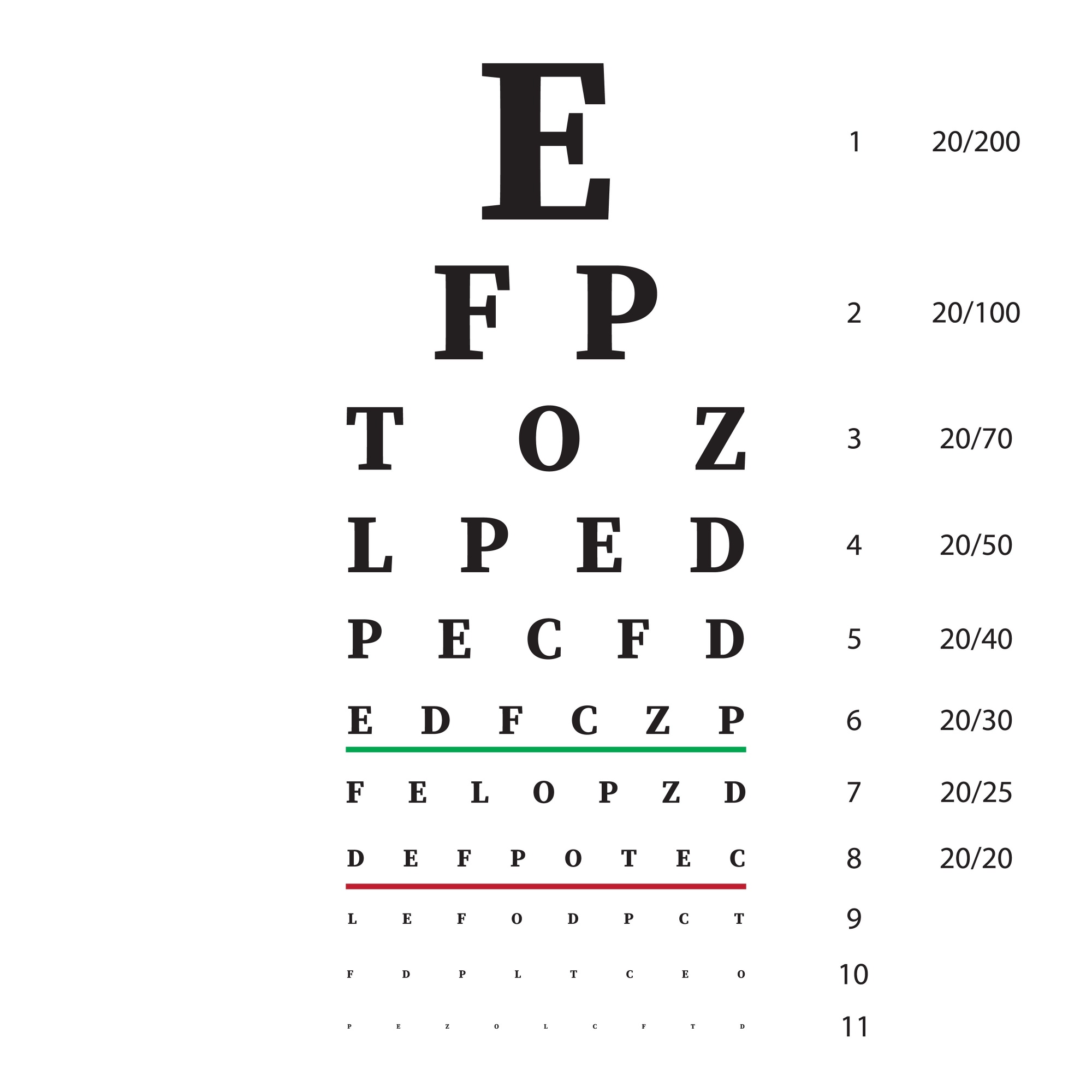What's On This Page?
ToggleExperiencing blurry vision is more common than you might think. With over 14 million Americans facing visual impairments including myopia, hyperopia, astigmatism, and presbyopia, the quest for clarity is widespread! It’s the topic of this article.
Fortunately, from dietary changes to medical interventions, a multitude of options exists to enhance your visual health. Before we get into the causes and solutions, I’ll post the eyesight chart here, in case you want to take a crack at it, and see where you land. If you’re giving the eyesight testing chart below a try (but you are on your device) position yourself about 10 feet (3 meters) away from your screen.
Adjust the brightness and use full resolution. Keep the room well-lit to avoid glare. When reading the chart, cover one eye at a time without pressing on it, and start from the top, working your way down until the letters get too tough to see. And just a friendly reminder, while this test is handy and fun, it’s not a replacement for seeing a professional eye doctor – check ups are critical. I am just having fun right now and posting what you’d see at doc’s office. Give it a try now, or just scroll down and keep reading.

Understanding the Causes of Blurry Vision
Blurry vision can stem from several sources:
- Refractive Errors: The most prevalent cause, these occur when the eye’s shape hinders light from focusing on the retina. Refractive errors occur when the eye fails to properly bend and focus light directly onto the retina, leading to distorted and blurry vision. These issues may stem from conditions like near-sightedness, far-sightedness, presbyopia, or astigmatism. It’s just because the eye doesn’t bend light right, making things look blurry and this is the #1 cause for trips to the eye doctor.
- Dry Eyes: Insufficient or poor-quality tear production can blur vision. Black currant extract helps with this, that’s why it’s in my Vision Script®. Low humidity, air conditioning, and problems with oil production in the eyelids (Meibomian gland dysfunction) can cause this problem, among other reasons.
- Cataracts: Cloudy formations in the lens can diminish sight. Aging is the most common cause of cataracts, however, these occur in people younger than 40 years old sometimes. In this case, it may be tied to using steroid medications, having diabetes, high blood pressure, or eczema.

- Glaucoma: This damages the optic nerve, typically due to elevated eye pressure.
- Age-Related Macular Degeneration (AMD): Affects the macula, which is crucial for central vision.
- Diabetic Retinopathy: High blood sugar levels can harm retinal blood vessels. Read more about this condition at the MAYO CLINIC site.
- Eye Infections and Inflammation: Conditions like conjunctivitis or uveitis can temporarily obscure vision.
- Medications: Certain drugs, including antihistamines and antidepressants, may induce side effects like dry eyes or blurred vision.
Natural Remedies for Blurry Vision
Before turning to pharmaceuticals, consider these natural approaches:
- Eye Exercises: Enhance focus and reduce strain with routines like the Focus Change and Figure Eight.
- Nutrition and Supplements: Essential nutrients such as Vitamins A, C, E, Omega-3 Fatty Acids, Lutein, and Zeaxanthin play critical roles in eye health.
- Herbal Remedies: Bilberry, Ginkgo Biloba, and Eyebright have traditional applications in vision care. In recent years, saffron has come into focus as a natural herbal remedy.
- Hydration: Sufficient water intake is useful to preventing dry eyes.
- Medication: Minimizing anticholinergic drugs will help as well. Things like antihistamines and others. You may be interested in the list of anticholinergic drugs which I posted in my other blog, Causes and Solutions for Dysphagia.
- Lutein and Zeaxanthin Supplementation: Research indicates that these antioxidants can significantly enhance visual acuity and contrast sensitivity.
- Omega-3 Fatty Acids: These are shown to improve symptoms of dry eyes and overall eye health.
- Black Currant Extract: This is a very special and useful herbal remedy for managing dry eyes.
Pharmaceutical Approaches to Managing Blurry Vision
When natural remedies do not adequately address blurry vision, various pharmaceutical options are available that can provide relief and treatment. Understanding these options, along with their proper usage and potential side effects, is crucial for safe and effective care:
- Artificial Tears: These over-the-counter lubricating eye drops are a frontline treatment for dry eyes, which can cause or exacerbate blurry vision. They help maintain moisture on the outer surface of your eyes, making them essential for individuals who spend long hours in front of computer screens or in dry environments. Consumers should be aware that different formulations are available, including preservative-free types that are generally recommended for more frequent use to avoid potential irritant reactions from preservatives.

- Antibiotics or Antiviral Drugs: If an eye infection is the root cause of blurry vision, specific antibiotics or antiviral medications may be prescribed. It’s important to use these drugs exactly as prescribed to effectively clear up the infection. Overuse or misuse can lead to resistance, rendering these drugs less effective in future treatments.
- Anti-inflammatory Medications: Steroid eye drops can be prescribed to reduce inflammation for conditions such as uveitis, a form of eye inflammation that can cause blurriness. While effective, these drops must be used with caution due to potential side effects such as increased intraocular pressure and heightened risk of infection. Patients using steroid eye drops should be regularly monitored by their healthcare provider.
- Steroids, used for a variety of conditions, can lead to cataracts and increased risk of glaucoma if used long-term.
- Certain antihistamines and antidepressants may also lead to dry eyes or blurred vision. That’s because these drugs have anticholinergic side effects in some cases, and that means they dry you out. So constipation, and blurred vision are common side effects. If you encounter these side effects from the medication, you may want to read my other article, The 5 Best Natural Antihistamines.
- Medications for hypertension such as beta blockers can alter tear production, potentially leading to dry eyes and blurred vision. Read my other article about 8 Natural ACE Inhibitors for Heart Health and Hypertension.
Eye Health and Common Medications: As a pharmacist, it is vital to highlight that many commonly prescribed systemic medications can impact eye health.
Consult Your Doctor if Needed
Blurry vision is usually normal with aging but it may occasionally signal other possibly more serious health issues. Consult your doctor if you get any of these symptoms:
- Sudden Onset: Abrupt changes in vision should never be ignored.
- Pain or Redness: These symptoms can indicate serious infections or glaucoma.
- Accompanying Symptoms: Such as floaters or flashes of light, which could suggest retinal detachment.
- Persistent Symptoms: Ongoing or worsening blur demands professional evaluation.
Summary
Blurry vision can be daunting, yet a range of solutions exists that span from simple dietary adjustments to advanced medical procedures. By understanding the causes of your blurry vision and consulting with professionals, you can tailor a treatment plan that best suits your needs. Remember, early intervention is key to maintaining long-term eye health and clarity.
- Always check with a pharmacist or doctor when starting a new medication to understand its potential impacts on eye health.
- Monitor eye health regularly when using any eye-related medication and report any persistent side effects.
- Be cautious of over-the-counter eye care products and seek professional advice, as some may interact with prescription medications or exacerbate existing conditions.
- If using multiple eye drops, space their administration appropriately to ensure each medication is properly absorbed.
By being informed about the pharmaceutical management of blurry vision, consumers can better navigate their options and ensure they are using these treatments safely and effectively.

Suzy Cohen, has been a licensed pharmacist for over 30 years and believes the best approach to chronic illness is a combination of natural medicine and conventional. She founded her own dietary supplement company specializing in custom-formulas, some of which have patents. With a special focus on functional medicine, thyroid health and drug nutrient depletion, Suzy is the author of several related books including Thyroid Healthy, Drug Muggers, Diabetes Without Drugs, and a nationally syndicated column.



